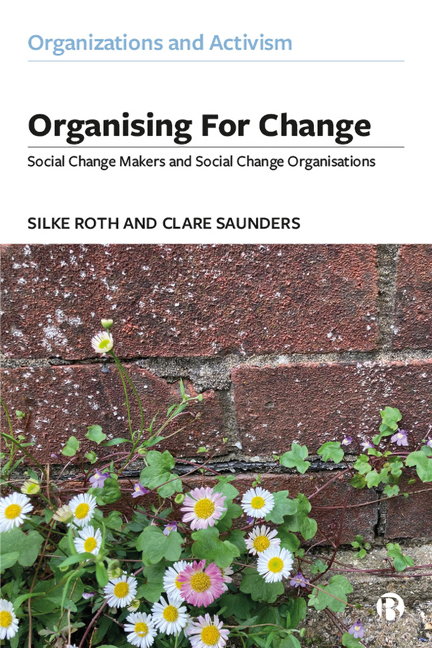Book contents
- Frontmatter
- Dedication
- Contents
- Series Editors’ Preface
- List of Figures and Tables
- Acknowledgements
- Introduction
- 1 What Are Social Change Makers and Social Change Organisations?
- 2 The Big Picture: Social Change Makers and Social Change Organisations in Historically Variable Contexts
- 3 Ways of Making Change
- 4 No Such Thing as a Free Gift: The Sources and Consequences of Resource Choices
- 5 People Making Change
- 6 Collaboration, Competition and Conflict
- 7 Outcomes of Social Change Making
- Conclusions: Organising for Change
- Appendix: Our Projects
- Notes
- References
- Index
1 - What Are Social Change Makers and Social Change Organisations?
Published online by Cambridge University Press: 28 March 2024
- Frontmatter
- Dedication
- Contents
- Series Editors’ Preface
- List of Figures and Tables
- Acknowledgements
- Introduction
- 1 What Are Social Change Makers and Social Change Organisations?
- 2 The Big Picture: Social Change Makers and Social Change Organisations in Historically Variable Contexts
- 3 Ways of Making Change
- 4 No Such Thing as a Free Gift: The Sources and Consequences of Resource Choices
- 5 People Making Change
- 6 Collaboration, Competition and Conflict
- 7 Outcomes of Social Change Making
- Conclusions: Organising for Change
- Appendix: Our Projects
- Notes
- References
- Index
Summary
Let us start with a couple of examples of SCOs and SCMs. Members of the Coalition of Labour Union Women (CLUW), an organisation that was founded in Chicago 1974 and which bridges the US women’s and labour movements (Roth, 2003), have been involved in a range of social movements simultaneously and successively. Some of the ‘founding mothers’ who were born in the 1920s and 1930s were long-standing trade unionists who were also involved in the civil rights movement marching with Martin Luther King and supporting the women’s movement and the struggle for the Equal Rights amendment. In contrast, some of the ‘rebellious daughters’, who were born in the 1940s and 1950s, had been involved in the farmworkers’ movement, supported the Black Panthers, and were involved in various feminist organisations including a feminist healthcare collective that provided abortions. The ‘political animals’, were involved in community organisations and the Democratic Party, and became union members after starting to work in the public sector. Finally, the ‘fighting victims’ became politicised after they had received support through their union at the workplace. While each of these four types came to CLUW on a different trajectory, what was important to all was to frame ‘women’s issues’ as ‘workers’ issues’ and vice versa while also fighting for racial justice. Many felt that supporting the Democratic Party was an important strategy in addition to participating in strike action and engaging in lobbying at the local, state, and national levels.
Our second example is based on our knowledge of environmentalists, derived from our in-depth interviews with environmental activists and participant observation in environmental organisations. Jo thinks of their self an environmentalist. For the past 15 months they have worked as a conservation volunteer with a county-wide branch of a national conservation organisation in the UK. They spend one weekday every week (outside of the school holidays) working with a small group of other conservation volunteers removing invasive species, planting trees, opening up spaces to allow cattle to graze, and managing ponds. Jo has always been a nature lover, but since volunteering began to appreciate the gravity of the environmental and climate crises through their communications with others. They now attend annual climate change marches, and have, more recently, joined a network that engages in civil disobedience to raise the profile of the climate crisis. At the previous annual climate change march, they encountered a counterdemonstration.
- Type
- Chapter
- Information
- Organising for ChangeSocial Change Makers and Social Change Organisations, pp. 24 - 36Publisher: Bristol University PressPrint publication year: 2023



